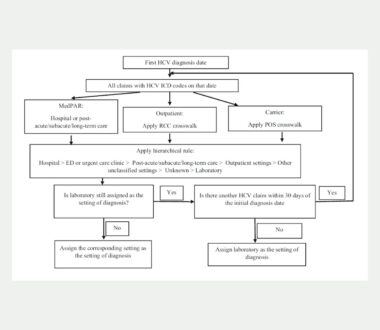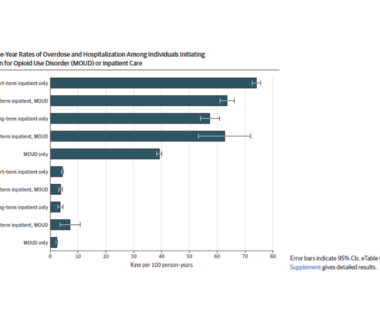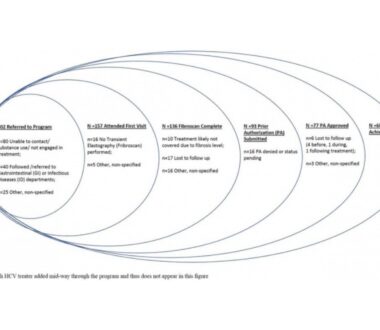
Association between claims-based setting of diagnosis and treatment initiation among Medicare patients with Hepatitis C
Direct-acting antivirals (DAAs) have been available since 2015 for hepatitis C (HCV). Nonetheless, very few patients with HCV initiate DAA treatment, ranging from 5% to 30%. The location where a patient is first diagnosed can also influence the care patients receive afterward, especially when a referral to a specialist or coordinated care is needed. In […]

A Catch-Up on Promising Efforts to Mitigate the Opioid Crisis
For the last 20 years or so, the U.S. has seen a significant increase in opioid and drug overdoses overall. And while there was a slight leveling before the pandemic, “we’ve seen huge increases since COVID-19,” said Margaret Lowenstein, an LDI Senior Fellow, addiction medicine physician, and an Assistant Professor of Medicine at the Perelman School of […]

Five Researchers Receive CHERISH Pilot Awards to Advance the Treatment of Substance Use Disorders, HCV, and HIV
The Center for Health Economics of Treatment Interventions for Substance Use Disorder, HCV, and HIV (CHERISH) is proud to recognize five early-stage researchers who will receive up to $20,000 in pilot grant funding between 2022 and 2023. Through the CHERISH pilot grant, researchers can investigate innovative methodologies or applications, collect preliminary data to inform external […]

Hepatitis C Treatment by Non-specialist Providers in the Direct-acting Antiviral Era
Direct-acting antiviral agents (DAAs), highly effective treatments for hepatitis C virus infection (HCV), transformed HCV therapy and made it easier for non-specialist providers to prescribe HCV treatment. Despite this simplification, many insurers include being a specialist as part of prior authorization requirements for DAA treatment. CHERISH Research Affiliate and former pilot grant recipient Shashi N. […]

Inpatient care versus outpatient MOUD treatment for individuals with OUD
In a new study in JAMA Network Open, CHERISH investigators Jake Morgan, Sean Murphy, Alexander Walley, Benjamin Linas and Bruce Schackman and colleagues, examined whether rates of opioid-related overdose and all-cause hospitalization differed after outpatient medication treatment or inpatient care for opioid use disorder. They studied individuals who had received one of three federally- approved medications […]

Hospital Financial Incentives to Improve Care After Opioid Overdose
Early analysis of Pennsylvania’s program Two patients are treated for opioid overdose at two different hospitals, just a few miles apart. The first hospital provides life-saving treatment to reverse the overdose and watches the patient for an hour, discharging them when deemed “medically stable.” The second hospital also provides life-saving treatment but then offers counseling, […]

Achieving Value in Substance Use Disorder Treatment: Paying for What Works (and Not Paying for What Doesn’t): Workshop Summary
More than 100 policymakers, practitioners, and researchers discussed and debated how payment policy can promote evidence-based, cost-effective substance use disorder treatment, in a recent workshop hosted by the Center for Health Economics of Treatment Interventions for Substance Use Disorder, HCV and HIV (CHERISH) and the Leonard Davis Institute of Health Economics at the University of […]

Using the 340B Drug Pricing Program to Support Primary Care-Based Hepatitis C Treatment in a Safety-Net Hospital Patient-Centered Medical Home
Over 2 million people in the US had chronic hepatitis C (HCV) infection during 2013- 2016, and HCV remains a leading cause of morbidity and mortality in the United States. Expanding HCV treatment in primary care would improve treatment access and follow-up but is resource intensive, requiring significant staff support. Using a budget impact analysis, a new study […]
Engage with CHERISH
Submit a Consultation Request or Contact Us to learn more about how CHERISH can support your research or policy goals.